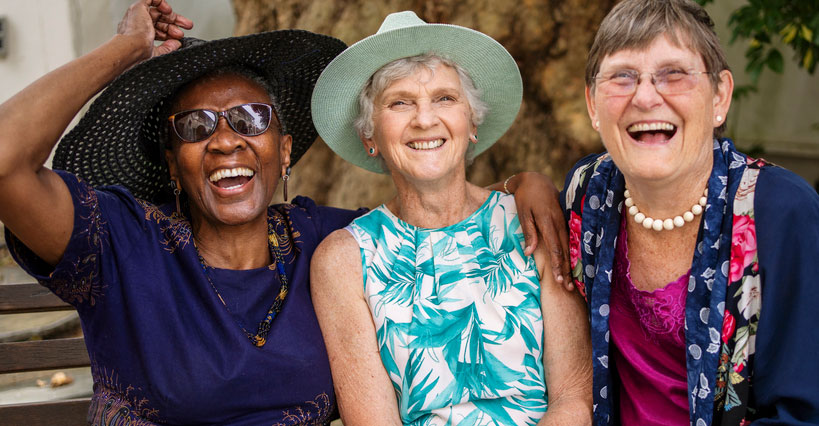Written by Sam Medley

According to the US Census Bureau, America will have more seniors than children by 2034. This phenomenon, dubbed the Graying of America, is driven by two things: people are living longer and having fewer babies.
But while most of the country is getting a little more salt-and-pepper, Florida already has more than a touch of gray. An astounding 22% of the state’s population are seniors. And as the state is going through a protracted growth spurt, drawing people in from all over the country, those age 60 and over represent the largest segment of new residents.
But despite the stereotype, not all of Florida’s seniors are snowbirds living out their golden years on a perpetual vacation. For many, reality is much harsher.
11% live below the poverty line. 18% live alone. Almost 600,000 have Alzheimer’s, dementia, or a related memory issue. And to top it all off, almost a quarter lack access to sufficient medical care.
It takes a diverse and highly-specialized workforce to serve this vulnerable population. And if the senior population grows like the Census Bureau expects it to, the workforce serving that population will need to grow right along with it. For that reason, gerontology could very well become one of biggest and most important specialty roles for Florida’s social workers.
What Do Geriatric Social Workers in Florida Do?
Geriatric social workers specialize in meeting the social, psychological, and physical health needs of seniors.
Typical duties for a gerontology social worker include:
- Performing needs assessments on individual seniors and communities.
- Counseling seniors battling existing mental health issues and those related to aging.
- Educating and counseling loved ones and caregivers.
- Assisting healthcare teams as seniors transition in and out of their homes, hospitals, assisted living communities, and memory care facilities.
- Advocating for their clients’ rights in cases of elder abuse, neglect, and exploitation.
While they’re equipped to help seniors with many of the challenges that arise with aging, they also work with other specialists to coordinate care and resource referral services for those with more complex needs.
In Florida, it takes an especially adept social worker to meet these needs. About 350,000 Florida seniors know little-to-no English, so bilingual skills are highly valuable. And as insurance costs in the state skyrocket, those living on fixed incomes may have to choose between medication, food, or shelter. So while Florida’s frontline geriatric social workers must be resourceful and creative, those working at the macro level to push for funding and increased accessibility to services are also key to pulling the right levers at the systemic level.
Getting Started in Gerontology Social Work in Florida with a BSW
While you can become a social worker in Florida with just a Bachelor of Social Work (BSW), many of the gerontology social work jobs you’ll find in the state require a master’s degree and clinical licensure. It’s no surprise that low income seniors would typically need at least some level of clinical assessment, particularly those who may have had limited access to preventative care and who may have conditions that have gone untreated.
But even at the bachelor’s level, you’ll find specialized education around serving this population, including BSWs with a minor concentration or undergraduate certificate in Aging Studies.
With plenty of support roles open to BSW graduates, you can gain invaluable work experience before enrolling in a master’s program.
For example, with a BSW, you can become a:
- Program or resident services coordinator who helps plan social events for senior living community residents.
- Family support worker who helps families care for high-needs seniors.
- Community health worker who helps physicians, nurses, mental health professionals, and social workers run outreach and community service initiatives.
- Case manager who connects seniors to medical, legal, housing, and psychological services in their communities.
In these roles, you’ll learn how to apply fundamental social work skills like case management and client interviewing to serving senior populations. And while you may not fill the role of social worker yourself, you’ll have the chance to learn from experienced professionals.
An MSW with a Clinical Specialization Might Be the Right Choice for Serving Aging Floridians
If you already have a bachelor’s degree but not a BSW, you can still enroll in a Master of Social Work (MSW). But with a BSW behind you, you can enroll in an Advanced Standing program and earn your MSW in as little as one year since you already know the fundamentals.
But before you start exploring MSW programs in Florida, it’s important to consider your goals. Do you want to work directly with seniors in a clinical capacity or serve in an administrative or community-based role?
Fortunately, MSW programs in Florida offer degree specializations for students embarking on either path.
MSW Specializations for Advanced Frontline Roles
Alone, mental health and substance use disorders are tough to treat. But when you throw dementia, cognitive decline, isolation, and chronic health issues into the mix, the situation becomes much more dire for seniors and their loved ones.
To help seniors grapple with all of those issues, senior service agencies of all kinds turn to Licensed Clinical Social Workers (LCSWs).
LCSWs are social workers who can diagnose and treat any number of mental, emotional, and behavioral health-related conditions. While you’ll find a few frontline roles that don’t require being an LCSW, a large portion of gerontology social worker jobs in Florida require clinical knowledge.

To become an LCSW in Florida, you can start by earning a CSWE-accredited MSW from a program that offers a clinical specialization, also referred to as a direct practice track. Most of the state’s schools of social work offer this specialization.
You’ll also need to earn an LCSW license from the Florida Board of Clinical Social Work, Marriage & Family Therapy and Mental Health Counseling.
This process involves:
- Taking master’s-level classes on psychotherapy and clinical interventions.
- Completing 1,500 hours (two years) of post-graduate supervised work experience.
- Passing a national licensing exam.
A clinical MSW program will include the right blend of curriculum and offer a practicum in a clinical setting to prime you for your required period of post-MSW experience. Once you’re licensed, you’ll be equipped for any number of frontline gerontology roles in Florida.
While you might work under the title of LCSW, you can also fulfill roles like senior service clinician, therapist, or counselor. In these roles, you’ll provide therapy services to seniors and help other professionals offer a comprehensive level of care.
MSW Specializations for Administrative and Community-based Roles
While LCSWs are legally authorized to provide clinical assessments and vital mental health services to seniors, they are fully prepared to provide much more. They connect seniors with nutrition services, help them with their Medicare benefits, arrange medical care, and even run the social programs that promote health and longevity while allowing the aging population to remain with familiar faces, firmly planted in their own local communities.

To learn how to lead such efforts, you can look for MSW programs in Florida that offer degree specializations in:
- Macro social work
- Leadership
- Advanced generalist practice
While the curriculum varies between schools, you’ll take classes about program evaluation, staff management, community education and outreach, and advocacy. Then, you’ll be equipped for positions like:
- Senior or aging services director.
- Program manager.
- Care manager.
- Transition of care coordinator.
- Community services coordinator.
In addition to earning an MSW, you can also become a Certified Master Social Worker (CMSW) through the Board. While not legally required for administrative positions, this state-issued certification is awarded to master’s-level social work administrators and even clinicians who’ve gone through a rigorous education and training process.
Another Thing To Look Out For: Graduate Gerontology Certificates
You will also find graduate certificate programs you can earn alongside your MSW or in addition to one you may already have, such as a Graduate Certificate in Gerontology or a Graduate Certificate in Social Work Practice for the Elderly.
As you earn your certificate, you’ll take classes on subjects like:
- The anatomy and psychology of aging.
- Assessing elderly clients.
- Serving the families of elderly clients.
- Policy evaluation and development.
- Medical social work as it pertains to elderly clients.
You’ll also have the chance to complete your fieldwork experience at an agency that primarily serves the senior population. Whether you’re specializing in clinical or administrative gerontology, that combination of classroom and hands-on learning can be invaluable.
Professional Certifications for Geriatric social workers in Florida
If you want to stand out in Florida’s massive senior services network, getting a professional certification in gerontology is a good way to do it. In the social work world, some of the most widely-respected certifications come courtesy of the National Association of Social Workers (NASW).
The NASW is the country’s biggest professional social worker organization. While the national organization is active itself, the Florida chapter hosts conferences, continuing education events, and is very involved with state-level advocacy and policy making.
But just as importantly, the NASW offers three professional gerontology certifications:
- The Social Worker in Gerontology (SW-G) certification for gerontology specialists with three years of experience and BSWs.
- The Clinical Social Worker in Gerontology (CSW-G) certification for geriatric social workers with clinical licenses, MSWs, and two years of experience.
- The Advanced Social Worker in Gerontology (ASW-G) certification for non-clinical geriatric social workers like administrators with MSWs and two years of experience.
Unlike graduate certificates (which are aimed at students who still need to learn more), professional certifications are for social workers who want to demonstrate that they’re competent, experienced professionals.
Finding Gerontology Social Work Jobs in Florida
Because Florida is home to one of the nation’s largest senior populations, it’s also home to one of the nation’s largest senior support networks. This network extends into the government, nonprofit, and private sector, all of which are great places to look for gerontology social work jobs.
Government Gerontology Social Work Jobs in Florida
The first natural place to start looking for jobs is the Florida Department of Elder Affairs (DOEA). This state agency develops policies about senior care and oversees many of the state’s senior services such as:
- Elder abuse prevention programs.
- Healthy aging education campaigns.
- Dementia research and memory care.
- The Hope Florida program, a program that pairs senior mentors with Florida youth.
The DOEA also works closely with the Adult Protective Services division of the Department of Children and Families to combat elder abuse and exploitation. If you’re interested in policy or law, these organizations may provide some unique career opportunities.
Nonprofit Gerontology Social Work Jobs in Florida
While the DOEA is instrumental to supporting Florida’s senior service network, their role is largely administrative. The main service providers are the state’s eleven Area Agencies on Aging (AAAs).
AAAs are nonprofit organizations that partner with and are supported by the DOEA. Each AAA oversees a specific region of the state. While services vary from region to region, AAAs typically provide:
- Adult day care.
- Gerontological counseling.
- Caregiver education and respite.
- Personal in-home care.
- Legal services and court advocacy.
- Meal delivery.
- Care transition coordination.
To administer these services, AAAs often work closely with healthcare providers, local senior centers, faith-based organizations, and other local partners. This community-based network is a great place for clinical and administrative geriatric social workers alike to look for jobs.
The Private Sector and Other Opportunities for Geriatric social workers in Florida
Florida’s nonprofit and government sectors primarily serve low-income and otherwise vulnerable seniors. However, seniors who don’t quite fit that description need help, too — and so do their families.
For that reason, you can find gerontology social work jobs in Florida in the private, healthcare, and mental health sectors, as well. This includes:
- Assisted living communities.
- Privately-operated memory care facilities.
- Skilled nursing facilities.
- Hospitals and surgery centers.
- Hospice clinics.
- Physical rehabilitation centers.
Because of the state’s growing senior population, there are perhaps more opportunities in these sectors in Florida than any other state. According to a 2024 report from the Miami Herald, Florida is home to more than 3,600 assisted living communities alone. With a strong background in senior services, you can help them provide the enriching, evidence-based services their residents deserve.
